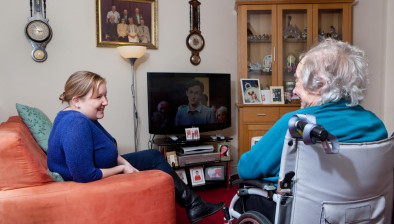Scotland’s home care service ‘at breaking point’, finds Unison report
 Care provided to vulnerable people in their own homes in Scotland is at “breaking point” as a result of cuts, according to a new report by Unison.
Care provided to vulnerable people in their own homes in Scotland is at “breaking point” as a result of cuts, according to a new report by Unison.
A survey of home care workers by the trade union found that four in five said they believe the service has been affected by budget cuts or privatisation with carers saying the emphasis was now on “quantity rather than quality”.
Nine in ten (88 per cent) said they were limited to specific times for client visits, with many reporting this was too short a period to properly cater to a client’s needs, while over a quarter (26 per cent) said they were not paid for their travelling time.
Two thirds (66.5 per cent) said they did not have anywhere to go between visits to have a meal, hot drink or toilet break and nearly half (43 per cent) said they worked longer than their contracted hours, according to the poll.
The findings are contained with Unison’s We care, do you? report which is also based on a freedom of information request to all local authorities in Scotland.
With the majority of care being carried out by private contractors, it leaves local authorities with little control over how home care functions are delivered.
Councils said 15 minute care visits were only for the most basic needs, but workers reported scheduling didn’t allow for longer visits. 24 out of 31 councils said they used a mixture of in-house and contracted-out staff. The percentages of the services contracted-out varied from 10 per cent (West Dunbartonshire) to 91 per cent (West Lothian). The number of contractors used varied widely too from three in East Renfrewshire to 38 in West Lothian.
While almost all councils say they pay the Scottish Living Wage to their own staff, not many believed their contractors do so. The recent Procurement Act allows payment of the living wage to be a factor in the issuing of contracts, but the councils who responded to our question said they did not use the procurement guidelines.
Unison Scotland is campaigning for local authorities to sign up to its Ethical Care Charter for home care services, which sets minimum standards to protect the dignity and quality of life for people who need home care. It commits councils to buying home care only from providers who give workers enough time, training and a living wage, so they can provide a better quality care for thousands of service users who rely on it.
Stephen Smellie, Unison Scotland’s depute convener, said: “This report highlights the shocking truths of a dedicated, caring workforce who are being stretched to the limit, often resulting in their own stress and ill-health.
“They juggle with travelling time and running late, to ensure their tasks are completed as best as they can, some often go back in their own time to make sure their clients’ needs are met.
“The most vulnerable people in our society rely on the services our home carers provide. They deserve better, much better – and so do care workers. This should include a decent, and reliable, wage for the work they do, with proper facilities and a workload which allows them to do their job properly. They care for us, it is only right that we in turn care for them.”
Dave Watson, Unison’s head of policy and public affairs, added: “As austerity bites, it seems care in the home is being perceived as the ‘cheap option’ compared to the cost of care homes or hospitals.
“The Scottish Government’s commitment to ensure the Scottish Living Wage is paid this October is a welcome step forward. In addition to fair pay, it is vital that Scotland’s councils sign up to Unison’s Ethical Care Charter which sets minimum standards for home care. It is particularly disappointing that the opportunities provided by the Procurement Act have not as yet been taken up by local authorities.”









